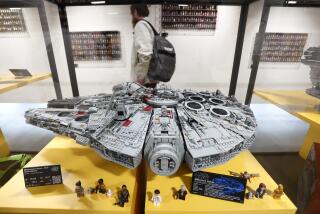John Houghtaling dies at 92; inventor of vibrating Magic Fingers bed
John Houghtaling, inventor of the vibrating Magic Fingers bed that once was pervasive in motel rooms and became a cultural touchstone for a generation of American travelers, has died. He was 92.
Houghtaling died Wednesday at his Fort Pierce, Fla., home of a brain hemorrhage after apparently falling and hitting his head, said his son Paul.
In 1958, Houghtaling -- pronounced “Huff-tail-ing” -- devised the Magic Fingers machines after he was hired to sell a combination mattress and box spring with a pre-installed vibrating mechanism. The beds didn’t sell well and were far too expensive, but he thought he saw a way to shake quarters out of motel guests.
Working in his New Jersey basement, he developed a fist-size motor that snapped onto existing box springs, transforming the bed into a “relaxation service,” as the Magic Fingers coin machines would advertise.
By feeding a quarter into a machine, motel guests could purchase about 15 minutes of shaking, a curious luxury that surely enticed children traveling with their parents, said Ed Watkins, editor of Lodging Hospitality magazine.
“It was probably the first guest-room amenity after the TV, and almost ubiquitous in motels in the 1960s and into the 1970s,” Watkins told The Times on Friday.
Within a few years, Houghtaling was selling more than $1 million worth of the devices annually to franchise operators, who installed them in motels on a revenue-sharing basis, according to a 2002 Wall Street Journal article.
At the height of their popularity, about 250,000 of the gadgets were in place across the country. The average coin box took in eight quarters a week, which added up to about $2 million a month in sales, American Heritage magazine reported in 2000.
Increasingly, the coin boxes were targeted by thieves, and motel owners gradually came to see Magic Fingers as a nuisance. Houghtaling developed a magnetic-strip debit card system for the machines, his son said, but it was too late.
Houghtaling sold the company in the 1980s and it has changed hands several times. A mail-order company sells a re- engineered model for the home on the Internet.
Magic Fingers also became entwined with pop culture. Jimmy Buffett sang about them in the mid-1970s in “This Hotel Room,” written by Steve Goodman:
Put in a quarter
Turn out the light
Magic Fingers makes
ya feel alright. . . .
The 1987 film “Planes, Trains and Automobiles” featured a beer-can explosion on a Magic Fingers-equipped bed. And long after the machines had largely disappeared from motel rooms, TV’s “The X-Files” showed Agent Dana Scully plunking quarters into a Magic Fingers at a motor inn.
When Houghtaling appeared as a mystery guest on the television game show “What’s My Line?” panelists figured out his Magic Fingers connection. After one panelist claimed that he was owed two bits because a machine had malfunctioned, Houghtaling tossed him a quarter while walking off the set.
John Joseph Houghtaling was born Nov. 14, 1916, in Kansas City, Mo., to John and Edna Houghtaling. His father was a telegraph lineman and his mother ran a shop that made doughnuts and potato chips.
During World War II, Houghtaling joined the Army Air Corps and flew 20 missions. Recalled to the military during the Korean War, he ran a Roswell, N.M., officers club.
Around 1950, he married his first wife, Ruth, who later helped him come up with the Magic Fingers name.
They had five children and divorced after about 30 years.
Early in his career, Houghtaling was a cookware salesman who pitched his product at dinner parties staged in the homes of prospective buyers.
In the early 1990s, he married his second wife, Rita Breier. After she died several years ago, he lived at the Fort Pierce marina on a boat named Magic Fingers. Hurricane Frances destroyed the marina and his boat in 2004, and he moved into a condominium.
Houghtaling had a knack for offering simple advice that became known as “John-isms.” One family favorite was, “The only way to coast is downhill.”
In addition to his son Paul, he is survived by three other sons, Chris, John and Mark; a daughter, Alison Lincoln; and four grandchildren.
More to Read
Start your day right
Sign up for Essential California for the L.A. Times biggest news, features and recommendations in your inbox six days a week.
You may occasionally receive promotional content from the Los Angeles Times.







